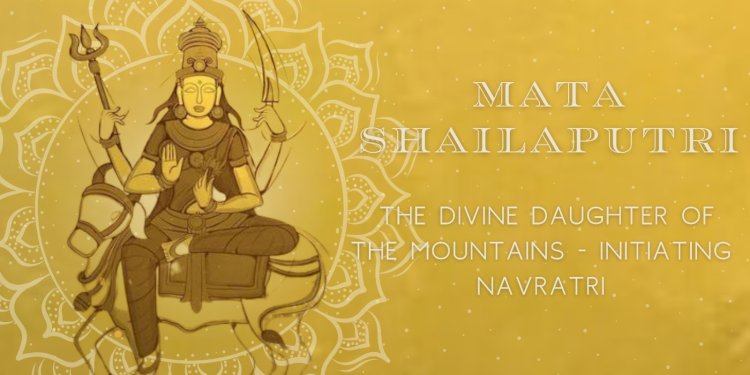Mata Shailaputri: The Divine Daughter of the Mountains - Initiating Navratri
Navratri, a nine-night festival in India, celebrates the divine feminine through worship and cultural festivities. It commences with the worship of Mata Shailaputri, symbolizing strength and devotion. The festival includes prayers, fasting, and vibrant dance forms like Garba and Dandiya. Navratri signifies the triumph of good over evil, and each day is dedicated to a different manifestation of the goddess. It's a time of spiritual reflection and community celebration, promoting unity in diversity. Happy Navratri!
By Shreya Rajvanshi Gangal

Happy Navratri! Navratri, one of the most vibrant and significant festivals in India, is a celebration of devotion, dance, and the triumph of good over evil. This nine-night festival is dedicated to the worship of the divine feminine in all her forms. It is a time when people come together, dress in traditional attire, and engage in joyous dances like Garba and Dandiya. But beyond the colorful celebrations, Navratri holds profound spiritual significance.
The Legend of Mata Shailaputri
Navratri begins with the worship of Mata Shailaputri, the first manifestation of Goddess Durga. Her name translates to "Daughter of the Mountain," where "Shaila" means mountain, and "Putri" means daughter. According to Hindu mythology, she is the daughter of Lord Himalaya, the king of the mountains, and is believed to symbolize the start of the divine journey.
Legend has it that in her previous life, Mata Shailaputri was born as Sati, the daughter of King Daksha. Sati fell in love with Lord Shiva and married him against her father's wishes. When Daksha organized a grand yagna (sacrificial ritual) and invited all the gods and goddesses, he intentionally omitted Lord Shiva from the guest list, deeply hurting Sati. Unable to bear the insult to her husband, Sati immolated herself in the fire of the yagna.
In her next life, she was reborn as Parvati, the daughter of the Himalayas. She embarked on a severe penance to win Lord Shiva's heart and eventually succeeded. Thus, Mata Shailaputri embodies the qualities of strength, devotion, and unwavering love.
Devotees celebrate the first day of Navratri by worshiping Mata Shailaputri, often depicted riding a bull and holding a trident in one hand and a lotus flower in the other. She represents the reawakening of our inner strength and our connection with the divine.
Navratri Celebrations
During Navratri, devotees across India create beautifully adorned shrines to pay homage to the divine mother in her various forms. The festival is marked by daily prayers, fasting, and vibrant cultural events, particularly in the western states of Gujarat and Rajasthan. The most popular dance forms during Navratri are Garba and Dandiya, where people gather in circles and dance to the rhythmic beats of traditional music. The colourful attire, lively music, and energetic dances make Navratri a time of merriment and togetherness.
The festival also celebrates the victory of Goddess Durga over the demon Mahishasura, symbolizing the victory of good over evil. The nine nights of Navratri represent the nine different forms of the goddess, and each day is dedicated to a specific manifestation. After Mata Shailaputri, the subsequent forms are Brahmacharini, Chandraghanta, Kushmanda, Skandamata, Katyayani, Kalaratri, Mahagauri, and Siddhidatri.
Conclusion
Navratri is more than just a festival; it is a time of spiritual reflection, cultural expression, and communal harmony. As we celebrate Mata Shailaputri and the many forms of the divine mother during these nine nights, we are reminded of the strength and love that reside within us. It's a time to seek blessings, connect with our inner selves, and celebrate the triumph of good over evil.
So, as you embark on this journey of devotion and celebration, remember that Navratri is not just about dance and festivities but also about embracing the power of the divine feminine and the essence of unity in diversity. Happy Navratri! May this festival bring joy, peace, and spiritual growth into your life.
What's Your Reaction?



















